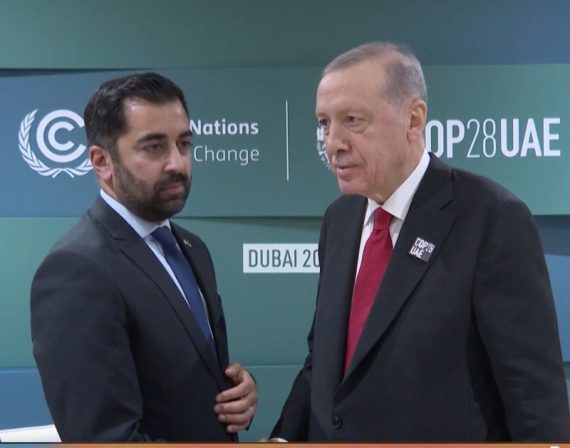T
he meeting of Humza Yousaf, who took office as Scotland’s first Muslim first minister in March 2023, with Turkish President Recep Tayyip Erdoğan at the UN Climate Change Conference (COP28) in Dubai caused a crisis between London and Edinburgh last week. David Cameron, who was appointed as Secretary of State for Foreign, Commonwealth and Development Affairs by Prime Minister Rishi Sunak last month, wrote a protest letter to Angus Robertson, Cabinet Secretary for Constitution, External Affairs and Culture of Scotland, regarding the Yousaf-Erdoğan meeting.
In his letter, which received wide publicity, Cameron reminded that Yousaf could not meet with any head of state and/or government without an official from the Foreign, Commonwealth and Development Office (FCDO), contrary to the protocol between London and Edinburgh. Cameron also warned that if this situation continues, the privilege that London offers to Scottish officials to arrange meetings with foreign state representatives will be terminated.
In other words, he implied that Scotland’s representation and visibility in the international community would be restricted. Considering that Yousaf was also warned by Cameron’s successor, James Cleverly, after meeting with Icelandic Prime Minister Katrin Jakobsdottir this August, the letter serves as the second warning for Yousaf.
There are three main reasons why Cameron reacted to Yousaf’s meeting with Erdoğan. The first and most important is the alleged violation of the protocol between the UK and Scotland. Accordingly, Cameron claimed in his letter that the relevant protocol was violated and that although an officer from the FCDO was present with the Scottish delegation in Dubai, he was not adequately informed about the meeting.
Scotland is independent in its internal affairs only
Before making a detailed assessment of the issues stated by Cameron in his letter, it is necessary to remember that Scotland is one of the four countries that make the United Kingdom along with England, Wales and Northern Ireland. According to the Scotland Act approved by the UK Parliament in 1998, which determines the limits of the transfer of authority to Scotland, Scotland is independent in its internal affairs but completely dependent on London in its foreign affairs. Therefore, Scotland is expected to follow the central government in London in matters of foreign policy.
In addition, the Scottish government can establish international ties just like the governments of Wales and Northern Ireland do. However, an official appointed by the FCDO must be present during these meetings. This is what Cameron means when he refers to a protocol violation in the letter. When looking at the issue from this perspective, if Yousaf’s delegation did not inform the FCDO official about the meeting, as Cameron claimed, they would have been found violating the relevant protocol. With this assumption, Cameron reminds in the letter that Scotland is still part of the UK and cannot act autonomously in foreign affairs.
On the other hand, Yousaf’s spokesman made a counter-statement refuting Cameron’s claims and said that they informed the FCDO official and invited him to the meeting. The spokesperson also stated that the FCDO official in the delegation was elsewhere at the time it was convenient for the Turkish president to meet, and the FCDO official was late for several meetings at the COP28 summit. Accordingly, contrary to Cameron’s claims, there was no protocol mistake by the Scottish delegation in the Erdoğan-Yousaf meeting.
Israel and Palestine
Secondly, with this letter, the London administration essentially wanted to remind that Scotland should act in accordance with the policies determined by London in the Israeli-Palestinian conflict, as in other foreign policy issues. At this point, it is important to recall that the UK does not speak out against the massacres in Gaza because it defends the thesis that Israel has the right to defend itself against Hamas.
Moreover, PM Sunak paid a visit to Tel Aviv immediately after Israel’s attacks on Gaza began and emphasized that the UK is on Israel’s side. Therefore, just as the UK pioneered the formation of an artificial state (Israel) in the heart of the Middle East with the Balfour Declaration in 1917, today it turns a blind eye to the massacres of the same state.
On behalf of the Scottish government, First Minister Yousaf follows a completely different policy from London regarding Israel’s attacks on Gaza. So much so that Yousaf, whose wife is a Palestinian from Gaza, loudly opposes Israel’s massacres in Gaza and does not refrain from stating that Israel targets civilians there. Yusaf also says that Scotland is ready to accept the aggrieved Palestinians from Gaza as refugees and calls for a ceasefire.
These “contrary” comments disturb both Israel and Israel-supporting British government, as they contradict Israel’s disinformation-based arguments. As a matter of fact, Cameron clarified in his letter that the UK and Scotland have to be coherent on the world stage. This implies that Scotland, like the British government, should ignore Israel’s massacres in Gaza!
Criticism of Israel for the massacres in Gaza
The reason why London became quite uncomfortable with the meeting is that Yousaf’s criticism of Israel for the massacres in Gaza and expressing the facts on the issue harms Israel’s superiority of discourse in the international community and allows the opposition front against Israel, which grows every day, to strengthen.
Naturally, this disturbs Israel and its supportive British ally. In addition, the fact that Yousaf met with in the shadows of Israel’s massacres in Gaza with an influential figure like Erdoğan, who has been trying to mobilize the international community against Israel, causes this discomfort. In other words, if the person Yousaf met in Dubai with was not Erdoğan who loudly opposes Israeli oppression, but a very dull figure on this issue, it would not have created such a stir in London.
Thirdly, Cameron is an important and experienced politician who served as the prime minister of the UK between 2010 and 2016. He faced two major crises during this time. The first of these was the referendum on Scottish independence, which took place in 2014. In this referendum, Scotland could not become an independent state because 44.7 percent of Scots voted to leave the UK and the remaining 55.3 percent voted to remain in the UK. Thus, Cameron eliminated this crisis.
Recommended
The European Union
Cameron’s second crisis was the European Union (EU) referendum in 2016. During the election campaign in 2015, Cameron promised a referendum on whether to continue the EU membership as an election promise. The Conservatives led by Cameron won the election and the referendum took place in June 2016. However, Cameron campaigned to remain in the EU during the referendum process, 51.8 percent of UK citizens voted to leave the EU. Thus, the UK’s separation from the EU (Brexit) took place.
Perceiving the EU referendum result as a political failure, Cameron resigned as Conservative Party leader and prime minister. In this way, he put the heavy burden of the Brexit process on his successor. Seven years later, Cameron was surprisingly appointed as the Secretary of State for Foreign, Commonwealth and Development Affairs by Prime Minister Sunak last month and returned to active politics. Now, if we evaluate the issue from this perspective, we can say that Cameron wanted to give a message to the public with his letter to Yusaf by saying: “I am back in politics.”
Finally, Cameron has threatened to withdraw Foreign Office support for overseas visits by Scottish government ministers, and close the SNP’s offices abroad if such protocol violations continue on international arenas. However, if London attempt to put pressure on Scotland with the oppressive and threatening rhetoric, this would disturb the Scottish society and open up space for pro-independence Scots’ demands and a new referendum. For this reason, if Cameron, whose political life constantly has oscillated between “yes and no”, does not act rationally regarding Scotland, he may face a new crisis in his political career that would be much more difficult to overcome.





